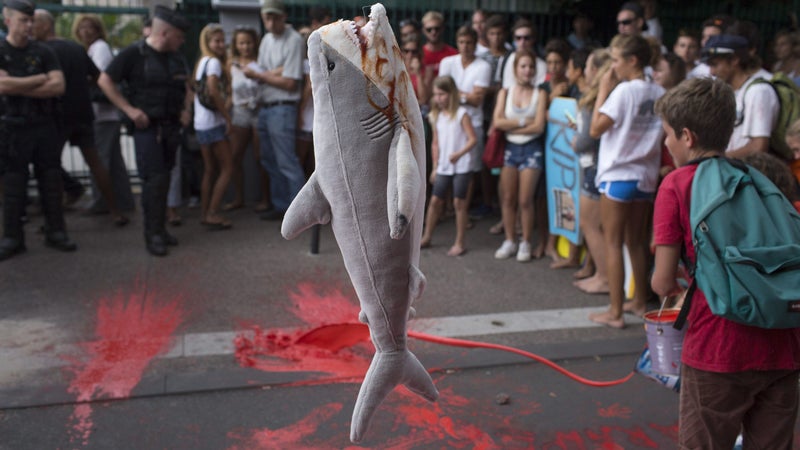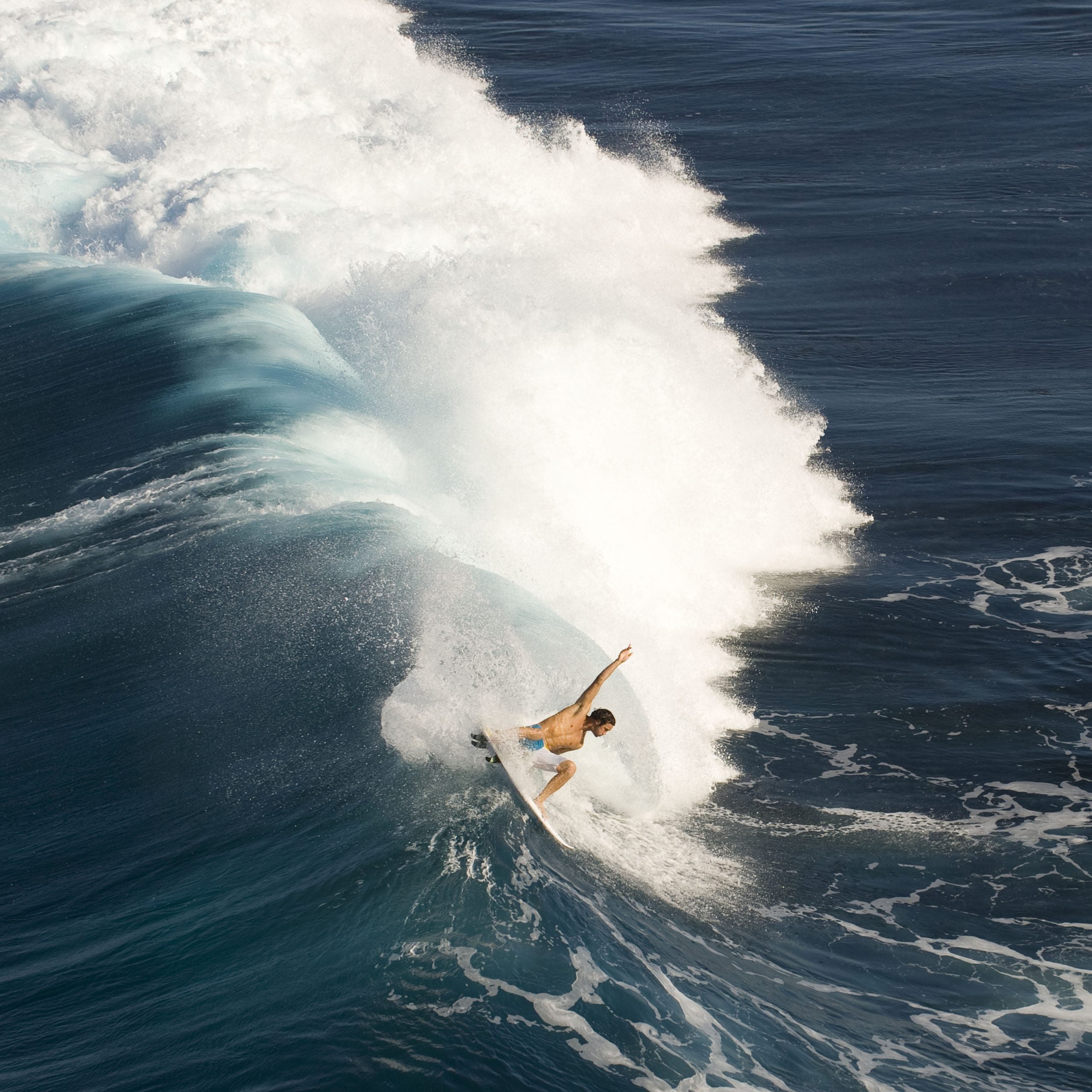Eleven-time world surf champion Kelly Slater has always been one of the good guys. Creative, astute, and generous, the improbably humble master of a sport not known for its understatement, he even managed to make appearing on Baywatch seem cool. He teaches autistic kids to surf. He plays guitar with Eddie Vedder. One time, he saved a mother and toddler from being swept away by a rogue wave. And he’s an activist. Climate change, fair trade, turtle conservation: name an environmental issue, Slater has stood up for it. The tagline for his clothing company, Outerknown, is #ItsNotOk. “We need to shift our awareness,” he is quoted, on its website. “It’s not ok to destroy our ocean.” So it was startling last week when Slater issued an impassioned call for a mass slaughter of sharks on Reunion Island, a tiny French territory in the Indian Ocean.
Reunion’s backstory is well known to surfers. Over the past six years, there have been 20 shark attacks in its surrounding waters, which happen to contain some of the world’s most alluring breaks. Eight of the attacks were fatal. The most recent victim, bodyboarder Alexandre Naussance, 26, died on February 21. Naussance, like the others, was bitten by a bull shark. “Honestly, I won’t be popular for saying this, but there needs to be a serious cull on Reunion, and it should happen everyday [sic],” Slater wrote afterward on Instagram. “There is a clear imbalance happening in the ocean there.”
That last sentence is certainly true. But not for the reasons Slater and infuriated locals believe; and far from improving things, their prescription—kill the sharks, open the island’s marine preserve to commercial fishing—would make the situation worse. Reunion’s real problem is not a crazy glut of marauding bull sharks, but an utterly tweaked marine ecosystem, sluiced with run-off pollution and garbage, overfished to the point of collapse. The solution is to fix it, not ruin it further.

In the wake of tragedy it’s understandable that emotions run hot, but shark culls are an awful idea, no matter how you look at it. Sharks have been here for 400 million years: they are older than trees on this planet. Somehow, they’ve managed to survive every mass extinction, with the possible exception of the one that’s unfurling right now, caused by us. Scientists estimate that we have already wiped out 90 percent of the world’s sharks, most deplorably by finning. The notion of killing more of them because they interfere with our watersports is obscene. As apex predators, they keep the entire ocean ecosystem in balance, particularly coral reefs. And if deep moral and environmental reasons aren’t enough, there’s also a pragmatic reason not to cull sharks: it doesn’t work.
Between 1959 and 1976, Hawaii culled almost 5,000 sharks—and the number of attacks stayed the same. (In recent years, they have risen.) In 2014, after a run of three shark fatalities in three years, Western Australia set out to cull great whites. Not a single white shark was captured, but the effort did kill 68 tiger sharks, a near-threatened species that hadn’t bitten anyone in Australia since 1929. Meanwhile, the nets and long-lines set out to ensnare sharks ended up killing everything else that swam by. The three-year program was terminated after 13 weeks.
Removing predators from an ecosystem always brings unintended consequences; it’s never a good idea. One reason bull sharks (a highly aggressive, non-native species) have moved into Reunion’s waters, in fact, is because the reef sharks (a relatively mellow native species) that competed with them for food are gone, killed by fishermen. (It also doesn’t help that the fish the sharks are competing for are largely gone, too.) In 2011, when the French government hired a team of freedivers to investigate Reunion’s waters, the team came back with unexpected news: they hadn’t encountered many sharks, but the few they could find were all in one area, orbiting a heap of trash on the seafloor near the Boucan Canot marina and Saint Gilles harbor, food and garbage and fish guts tossed from boats and washed off beaches. Virtually all of the attacks had occurred along this same stretch of coastline.
Bull sharks aren’t anyone’s favorite species—they’re wily, beady-eyed, hunchbacked sharks with an exceptionally strong bite (even for a shark), and they’re not choosy about what they attack. They’re fond of sewage, and like to lurk in the muddy, murky waters caused by rain runoff from Reunion’s steep volcanic slopes and urban areas. But like them or not, we need them. After decades of post-Jaws vilification, the critical role of sharks in the ocean seems to be gaining awareness, even in fraught situations like Reunion. After Slater posted his comment, thousands of people responded with varying degrees of outrage, ranging from, “Kind of blew it with that shark cull idea ya brah?” to “Maybe nobody has ever told you but it’s not YOUR ocean just because you get paid ridiculous amounts of money to surf in it,” to “Calling for a daily shark cull? You selfish, arrogant Vin Diesel looking motherfucker.”
So let’s take that cull off the table, and talk about what else can be done to help the good people of Reunion Island, who very reasonably want to be able to dip a toe in the ocean without having their foot ripped off. Shark tagging and monitoring, increased lookouts above and below the water, shark-repelling pylons on the seafloor, relocating certain sharks, cleaning up the garbage, mitigating runoff, allowing fish stocks to recover, avoiding surfing at dusk, or alone, or in the most dangerous areas, especially spots with murky, muddy water—yes, sorry, even when the waves are firing—all of these things would help. Nobody wants to tell a kid that he can’t go out on his boogeyboard because he might get bitten in half. But no one wants to see a sharkless, algae-slicked, trash-filled, dead ocean, either—including Kelly Slater, who walked back his comment a couple days after he’d made it, admitting: “I did not think my words through.”
Susan Casey is the best-selling author of The Devil’s Teeth: A True Story of Obsession and Survival Among America’s Great White Sharks.


